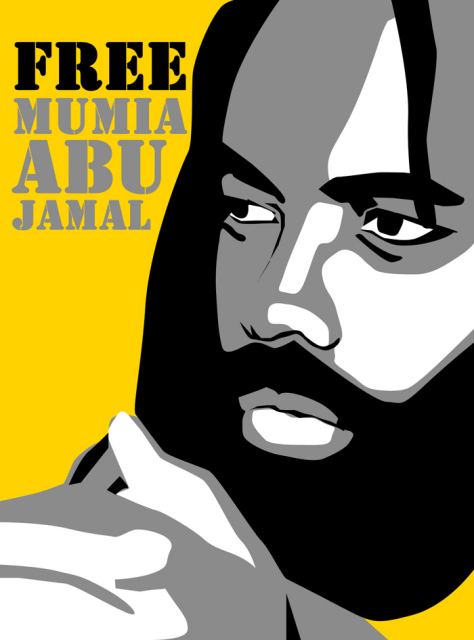|
|  |
Nov 9: Hearing on Mumia's death sentence
NYC Free Mumia Coalition - 31.10.2010 12:21
On November 9, 2010 the 3rd Circuit Court of Appeals will be debating of the african-american political prisoner Mumia Abu-Jamal. What is the issue with this court date? The only legal options to be considered at the Third Circuit's November 9 hearing are whether Mumia Abu-Jamal is to be executed or get life in prison without parole. Clearly neither of those two options are acceptable.

To fully grasp the significance of the hearing, one needs to revisit Federal District Court Judge William Yohn, Jr.'s decision of December 18, 2001. In that ruling the judge upheld Mumia's conviction but at the same time threw out his death sentence on the grounds that the verdict form used by the jury for sentencing at his trial violated the U.S. Supreme Court's Mills precedent and therefore entitled Mumia to have his death sentence overturned. Yohn then gave the state 180 days to convene a new jury trial only on the issue of Mumia's penalty, in which the choices would be either death or life in prison without parole. On the other hand, if the state did nothing, Yohn ruled that Mumia would automatically be sentenced to life in prison without parole.
At the time Judge Yohn stayed his ruling on the death sentence while the state appealed his decision to the next higher level of federal court, the Third Circuit Court of Appeals. (At the same time Mumia cross-appealed Judge Yohn's decision upholding Mumia's conviction.) Mumia was therefore never removed from Death row and remains there to this day.
On March 27, 2008, the Third Circuit upheld Yohn's decision on the death penalty on a 3-0 vote. Again the decision was stayed while the state appealed to the highest federal level, the Supreme Court. (In the same decision, the Third Circuit rejected Mumia's appeal on the conviction by 2-1 and, as before, Mumia cross-appealed that ruling.)
On January 10, 2010, the Supreme Court ordered the Third Circuit to reconsider its decision on the death sentence in light of its simultaneously-issued ruling unanimously rejecting an appeal from a white-supremacist named Spisak. That man admitted to killing at least two people in Ohio and openly wished to have murdered more. He had appealed his death sentence also as a violation of Mills, but involving a different aspect of it than Mumia's case. The Sixth Circuit, as did the Third Circuit in Mumia's case, ruled that the death sentence should be vacated, but the Supreme Court ruled that the Mills precedent did not apply in Spisak's case, and that therefore execution rather than life in prison was the appropriate penalty. Based on that decision, the Supreme Court immediately applied the same argument to Mumia's case and asked for the Third Circuit to reconsider the issue of execution for Mumia as well.
Thus, the hearing on November 9th is on Mumia's penalty only. The choices before the court are either to sustain Yohn's and its own earlier decisions or to reinstate the death penalty, clearing the way for Mumia's possible quick execution.
If the Third Circuit reaffirms its earlier decision to sentence Mumia to life in prison without parole, the state will most likely appeal to the Supreme Court. (This is exactly what happened with Spisak, after the Sixth Circuit upheld its own earlier ruling which had overturned the man's death sentence.) But in the unlikely event that the state doesn't appeal, it will then have 180 days to implement Judge Yohn's decision.
Of course if the Third Circuit rules against Mumia, he will appeal to the Supreme Court. However, the odds for relief are small, given the increasingly reactionary nature of that court.
Thus, Mumia's legal situation is extremely dangerous. His life truly is on the line, for no matter how the court rules, the only two choices under this legal system are either execution or life in prison without parole and, for the moment, the prosecution, with all its allies and backers, is fighting very hard for execution.
 E-Mail: NULLSPAM.info@freemumia.com E-Mail: NULLSPAM.info@freemumia.com  Website: http://www.FreeMumia.com Website: http://www.FreeMumia.com
|
| Lees meer over: vrijheid, repressie & mensenrechten | | aanvullingen |  | | justice on trial | nn - 01.11.2010 01:52
A film about the case: justice on trial
Mumia Abu-Jamal is the most recognized death row inmate in the world today. In 1982, he was was tried and convicted for the murder of Police Officer Daniel Faulkner. Since then, the Abu-Jamal trial proceedings have come under scrutiny and today his case is one of the most contested legal cases in modern American history. A former Black Panther and now renowned author, his books and writings in venues as diverse as the Yale Law Review, Forbes, Nation and street-papers for the homeless, have led many to hail him �the voice of the voiceless.�
Justice on Trial navigates the tempest of the Abu-Jamal trial by reviewing the known facts of the case. It demonstrates that the major violations in the Abu-Jamal case -- judicial bias, prosecutorial misconduct, racial discrimination in jury selection, police corruption and tampering with evidence to obtain a conviction-- are not special to this case. Instead, they are commonly practiced within the criminal justice system and account for the disproportionate incarceration of African Americans and Latinos in the United States. The case of Mumia Abu-Jamal is a microcosm of greater problems in the criminal justice system in the United States today. The attention that its many violations have received make the Abu-Jamal case one of the most important civil rights cases of our time.
 Website: http://www.bignoisefilms.com/films/tactical-media/114-justice-on-trial Website: http://www.bignoisefilms.com/films/tactical-media/114-justice-on-trial
| |
| aanvullingen | |

